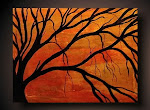First of all, this blót is connected to the Disir, but there is a more important time in the year ( at the midle of October ) when the winter nights or the Vinternatsblót comes, and by that time, it will be more likely for me to talk about the disir and their importance, meanwhile, i will talk about Dísablót.
Dísablót :
The Dísablót is the blót or the festival (sacrificial holiday) which is held in honour of the female spirits or deities called Dísir and to the Valkyries whom are female spirits as well. The main purpose of this festival is to enhance the coming harvest.
It seems this festival was held during the time of the winternights, but somehow, nowadays, this festivel is held at the spring time, and to celebrate the coming of the revival of nature!
The main purpose is also, as i have told before, to call and pray and honor all the female spirits, our female ancestors, the goddesses and other female beings. So i will leave this to be explained in the time of october, so we can keep honoring our ancestors in the month where they are most "active".
If you need more information or if you want to check my works, take a look at my Facebook page and make a like at --> www.facebook.com/ArithHarger
It seems this festival was held during the time of the winternights, but somehow, nowadays, this festivel is held at the spring time, and to celebrate the coming of the revival of nature!
The main purpose is also, as i have told before, to call and pray and honor all the female spirits, our female ancestors, the goddesses and other female beings. So i will leave this to be explained in the time of october, so we can keep honoring our ancestors in the month where they are most "active".
If you need more information or if you want to check my works, take a look at my Facebook page and make a like at --> www.facebook.com/ArithHarger








